While the Mark Foley mess has everyone’s attention riveted on the fast-changing congressional landscape, enviros should also keep an eye on gubernatorial races this November.
“The state level is where all the truly positive environmental action has been happening in recent years,” says Tony Massaro, senior vice president for political affairs with the D.C.-based League of Conservation Voters. This year, for the first time, LCV is channeling money to state conservation voter leagues to help them campaign for green gubernatorial candidates. “Governors occupy the executive branch, which means they can push for positive environmental change whether they’ve got a favorable legislature or not,” Massaro says.
The Sierra Club is also putting national funds toward governors’ races for the first time this year. “We decided that since the best policies are being made at the state level, that’s where we should be doing our politics as well,” says Sierra Club’s national political director, Cathy Duvall. In a few states, including Pennsylvania and Michigan, the group is putting more resources into gubernatorial campaigns than congressional ones.
Examples of ambitious state-level environmental initiatives are legion: Twenty-two states have implemented a renewable portfolio standard (RPS) mandating that a certain percentage of electricity come from clean sources such as solar and wind. Ten states have followed California’s lead in adopting clean-car legislation requiring new automobiles to have lower greenhouse-gas emissions starting in the 2009 model year. Seven states in the Northeast have joined the Regional Greenhouse Gas Initiative committing to carbon dioxide reductions of 10 percent by 2019. And California has, of course, outdone all the rest by becoming the first state in the nation to impose mandatory caps on greenhouse-gas emissions.
Companies loath to deal with a patchwork of differing state greenhouse-gas rules are increasingly calling for federal-level solutions that would give them more clarity and certainty. “Essentially, leadership at the state level is, via industry, calling Washington to action,” says Duvall. That makes governors with bold green vision all the more important.
Muckraker brings you a roundup of the most environmentally significant gubernatorial races in two parts: This week we’ll focus on key states along the Eastern seaboard — New York, Massachusetts, Pennsylvania, Maryland, and Florida — and next week we’ll cover states in the heartland and the West.
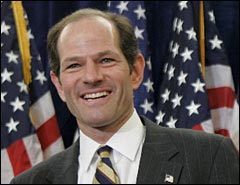
Eliot Spitzer.
New York: Eliot Spitzer (D) vs. John Faso (R)
Democratic gubernatorial candidate Eliot Spitzer has never been shy about where he stands on environmental protection — or anything else. “George Bush is, hands down, the worst president on environmental and energy issues that this country has ever seen,” the pugnacious Spitzer spouted during the first big environmental speech of his campaign. As New York’s attorney general, he’s sued the Bush administration numerous times over environmental issues, including greenhouse-gas emissions, mercury pollution from power plants, pesticide use in public housing, and efficiency standards for appliances.
Spitzer has taken plenty of polluters to court, too. Among his many victories, he forced six New York power plants to radically cut emissions that cause acid rain and smog, achieving reductions equivalent to removing 2.5 million cars from the road. He was also the first AG to sue operators of coal-fired power plants in other states, arguing that their pollution blows into New York and contaminates the air breathed by his constituents.
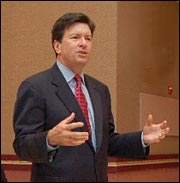
John Faso.
Massachusetts: Kerry Healey (R) vs. Deval Patrick (D)
Enviros are gleeful over Spitzer’s 46-point lead in the polls against Republican candidate John Faso, former minority leader of the state Assembly. They see Spitzer as one of the strongest environmental champions politics has produced in decades. One hundred and one leading environmental activists and green-leaning celebs have joined together to endorse Spitzer, from Robert F. Kennedy Jr. and Bill McKibben to Chevy Chase and Pete Seeger. “Combating global warming, cleaning up the Hudson River, and closing Indian Point [nuclear plant] are all issues that I know he will effectively address,” Kennedy said in a statement. “If anyone can solve these issues, it’s Eliot Spitzer.”
According to a recent New York Times poll, 64 percent of voters back Spitzer, while only 18 percent would vote for Faso.

Kerry Healey.
Enviros have a good chance of gaining a gubernatorial ally in Massachusetts, as well. Outgoing Gov. Mitt Romney (R) — who yanked his support from the Regional Greenhouse Gas Initiative at the last minute — decided not to run for a second term, in part to clear the way for a potential presidential run in 2008 and in part because of low approval ratings in his left-leaning state. He handed the GOP ticket to his lieutenant governor, Kerry Healey, whose environmental platform scarcely differs from Romney’s.
On the Democratic side — and substantially ahead in the polls — is Deval Patrick, a former assistant attorney general for civil rights under President Clinton who later headed up the equality and fairness task force at Texaco, then served as executive vice president and general counsel at Coca-Cola, where he encouraged sustainability efforts.
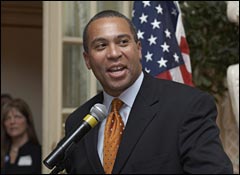
Deval Patrick.
“Patrick not only has an exciting environmental platform, he has the courage to implement it,” says Lora Wondolowski, executive director of the Massachusetts League of Environmental Voters. Patrick has promised to embrace RGGI, and was the first gubernatorial candidate to pledge strong support for the Cape Wind project, while many other Massachusetts politicians have tried to steer clear of the controversial issue in order to avoid angering either conservationists or wealthy liberals on Cape Cod who don’t want wind turbines obstructing their ocean views. “This is a guy who understands that sustainability and energy independence are defining terms of the 21st century economy,” says Wondolowski. Patrick has also pledged to steer more resources to the state’s parks and environmental agencies, which have the 48th-lowest funding of any state in the nation.
Healey, meanwhile, has publicly stated her opposition to both Cape Wind and RGGI, and proposed corporate sponsorship of state parks, according to Wondolowski. “If Healey had her way, you’d be taking a nature walk in rural Massachusetts through the Ben and Jerry’s state park,” says Wondolowski.
According to the most recent Rasmussen poll, Patrick is ahead 57 percent to 24 percent — a roomy 33-point lead.
Pennsylvania: Ed Rendell (D) vs. Lynn Swann (R)
Pennsylvania Gov. Ed Rendell (D), heralded in environmental circles for his clean-energy policies, has had to don his political helmet and pads in a feisty face-off against former-Pittsburg-Steeler-turned-ABC-sports-broadcaster Lynn Swann, who is running on the Republican ticket. Winner of four Super Bowls and honored in the Pro Football Hall of Fame, Swann may be a political novice, but his celebrity and charisma have won him a strong following among Pennsylvania’s conservative and rural voters. As a high-profile African-American, he is also popular among moderate black Democrats.
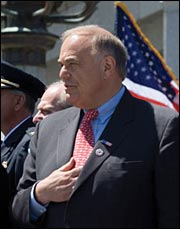
Ed Rendell.
Both the Sierra Club and the Pennsylvania League of Conservation Voters (PALCV) are throwing strong support behind Rendell, whose “record on clean-energy policy is one of the most ambitious in the nation,” says PALCV Executive Director Mike Fedor. In 2004, Rendell signed into law an RPS calling for the state to get 18 percent of its electricity from clean or alternative sources by 2020. Rendell lobbied hard to get Pennsylvania to adopt California’s clean-car regulations — which it did last month — while Swann came out against the rules. Rendell has also focused on making Pennsylvania a hub for emerging renewable-energy industries: He helped convince the Spanish wind-turbine giant Gamesa to locate its North American headquarters in Pennsylvania, and is pushing to site biofuel plants and ethanol fueling stations throughout the state.
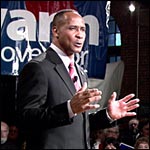
Lynn Swann.
Rendell has also taken an aggressive stance against mercury pollution in Pennsylvania, where nearly every lake and river is under a fish-consumption advisory due to mercury contamination from coal-fired power plants. He’s advocating a plan that would require the power plants to reduce mercury emissions 90 percent by 2015 — far more ambitious than federal requirements laid out by the Bush administration. In his second budget, Rendell proposed that the state invest $800 million in preservation of farmland and open space, cleanup of old mines, and other environmental projects. The legislature eventually whittled his proposal down to $625 million, but it was still, says Fedor, “the most substantial investment in the environment that the state has made to date.”
A September Keystone poll [PDF] shows Rendell ahead of Swann 52 percent to 34 percent — a lead of 18 points.
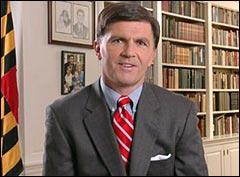
Robert Ehrlich.
Maryland: Robert Ehrlich (R) vs. Martin O’Malley (D) ,?h3>
Maryland Gov. Robert Ehrlich (R), who’s running for a second term, earned a D+ [PDF] from the Maryland League of Conservation Voters last year for his environmental record. While the group gave him a thumbs-up for his work on the Chesapeake Bay, he got bad marks for enabling sprawl, failing to rein in air pollution, doing little to improve mass transit, and diverting millions of dollars that had been dedicated to preserving open space, parks, and wildlands.
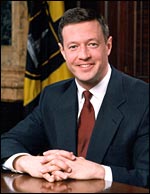
Martin O’Malley.
“Marylanders cannot afford another four years of Gov. Ehrlich,” says Maryland LCV Executive Director Cindy Schwartz, whose organization has thrown its support behind Democratic challenger Martin O’Malley. The former mayor of Baltimore, O’Malley earned respect among enviros last year when he signed his city onto a lawsuit filed by 11 states against the Bush administration over its weak mercury regulations; Ehrlich had refused to let the state as a whole join the suit. Also, says Schwartz, “[O’Malley] has proposed an ambitious program for monitoring and cleaning up pollution in the Chesapeake Bay, and will be a strong ally in fighting sprawl and protecting open space.”
According to a Sept. 19 Rasmussen poll, O’Malley has a 7-point edge among likely voters, leading 49 percent to Ehrlich’s 42 percent.
Florida: Charlie Crist (R) vs. Jim Davis (D)
Outgoing Gov. Jeb Bush (R) has earned a mixed environmental record in a state where green issues play big. Voters in Florida, with its tourism-reliant economy and booming population, care a great deal about offshore drilling, Everglades protection, and sprawl. Jeb Bush, once applauded by conservationists for convincing brother Dubya not to open the waters off Florida’s coast to offshore drilling, lost favor when he buckled under Republican pressure and agreed to back a compromise that would allow offshore drilling more than 125 miles off the coastline.
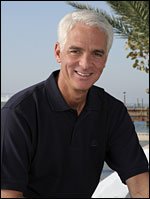
Charlie Crist.
Florida Attorney General Charlie Crist, the GOP’s pick to replace Bush, is expected to hew fairly closely to the current governor’s environmental agenda. Enviros have higher hopes for his Democratic opponent, Jim Davis, who has racked up a solid 83 percent lifetime rating from LCV during his eight years in the House of Representatives.
“Crist isn’t horrible — he might even be a shade better than [Jeb] Bush on the environment,” says Dan Hendrickson, legal chair of Sierra Club’s Florida chapter. “But Davis has been a dynamite environmental champion in Congress, and is exactly the kind of leader the Sunshine State deserves — one who’s pro-solar and pro-mass transit.”
While Crist has generally opposed offshore drilling and voiced support for sustainable-development initiatives, he hasn’t been considered a leader on these issues. Hendrickson worries that Crist would be swayed by the Republican Party’s general pro-industry slant: “My sense is that, as a moderate governor, he’d have trouble dragging against the GOP influence. He’d sit on sidelines.”
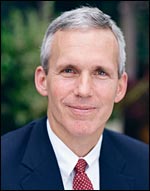
Jim Davis.
Davis, for his part, has been at the forefront of the congressional fight to keep oil drills out of Florida’s coastal waters, and has consistently voted to protect the Arctic National Wildlife Refuge as well. He’s also been a strong advocate for Everglades restoration, renewable energy, and energy conservation.
Recent polls give Crist the advantage. An Oct. 2 survey of likely voters by Rasmussen Reports found Crist with 54 percent support compared to Davis’ 38 percent.

